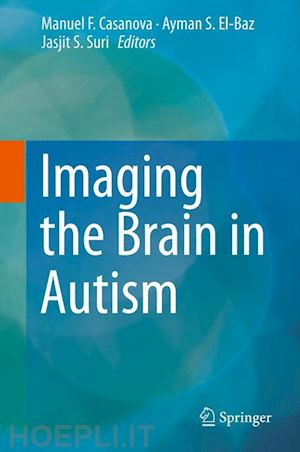

Questo prodotto usufruisce delle SPEDIZIONI GRATIS
selezionando l'opzione Corriere Veloce in fase di ordine.
Pagabile anche con Carta della cultura giovani e del merito, 18App Bonus Cultura e Carta del Docente
Data compiled by the Center for Disease Control and Prevention indicates an alarming and continuing increase in the prevalence of autism. Despite intensive research during the last few decades, autism remains a behavioral defined syndrome wherein diagnostic criteria lack in construct validity. And, contrary to other conditions like diabetes and hypertension, there are no biomarkers for autism. However, new imaging methods are changing the way we think about autism, bringing us closer to a falsifiable definition for the condition, identifying affected individuals earlier in life, and recognizing different subtypes of autism.
The imaging modalities discussed in this book emphasize the power of new technology to uncover important clues about the condition with the hope of developing effective interventions. Imaging the Brain in Autism was created to examine autism from a unique perspective that would emphasize results from different imaging technologies. These techniques show brain abnormalities in a significant percentage of patients, abnormalities that translate into aberrant functioning and significant clinical symptomatology. It is our hope that this newfound understanding will make the field work collaborative and provide a path that minimizes technical impediments.
Introduction to Neuropathology.- The Neuropathology of Autism.- QEEG-Guided Neurofeedback for the Autism: Clinical Observations and Outcomes.- Event-Related Potential Studies of Cognitive Processing Abnormalities in Autism.- Evoked and Induced Gamma Frequency Oscillations in Autism.- Neurofeedback for Autistic Disorders: Emerging Empirical Evidence.- Structural Imaging in Autism.- Diffusion Tensor Magnetic Resonance Imaging in Autism.- Spectroscopic Brain Imaging in Autism.- Functional MRI in Autism.- Functional Connectivity MRI in Autism.- EEG Analyses in the Assessment of Autistic Disorders.- Behavior Imaging®’s Assessment Technology.
Jasjit S. Suri, MS, PhD, MBA is an innovator, visionary, scientist, and an internationally known world leader. Dr. Suri was crowned with Director General’s Gold medal in 1980 and the Fellow of American Institute of Medical and Biological Engineering (AIMBE), awarded by National Academy of Sciences, Washington DC in 2004. Dr. Suri has been the chairman of IEEE Denver section and has won over 50 awards during his career and has held executive positions.
Manuel F. Casanova is a Board Certified Neurologist trained in clinical electroencephalography and evoked response potentials. His research focus is Autism Spectrum Disorders. Dr Casanova is an Endowed Chair Professor, and is the Associate Chair for Research in the Department of Psychiatry and Behavioral Sciences at the University of Louisville. He has over 20 years of experience in the neurosciences. During the last 5 years he has published 43 refereed articles, edited 3 books, wrote 4 letters to the editor and has completed 74 congressional presentations worldwide. He is one of the founders of the Autism Center at the University of Louisville. He was principal investigator on several federal grants, and now his is a PI on an NIH Eureka grant aimed at the application of TMS in autism.Ayman S. El-Baz is currently assistant professor of Bioengineering in the Department of Bioengineering at the University of Louisville (UofL). He is an expert in the fields of bioimaging modeling and computer assisted diagnosis systems. Dr. El-Baz received his Doctorate from the University of Kentucky, Louisville, KY.











Il sito utilizza cookie ed altri strumenti di tracciamento che raccolgono informazioni dal dispositivo dell’utente. Oltre ai cookie tecnici ed analitici aggregati, strettamente necessari per il funzionamento di questo sito web, previo consenso dell’utente possono essere installati cookie di profilazione e marketing e cookie dei social media. Cliccando su “Accetto tutti i cookie” saranno attivate tutte le categorie di cookie. Per accettare solo deterninate categorie di cookie, cliccare invece su “Impostazioni cookie”. Chiudendo il banner o continuando a navigare saranno installati solo cookie tecnici. Per maggiori dettagli, consultare la Cookie Policy.